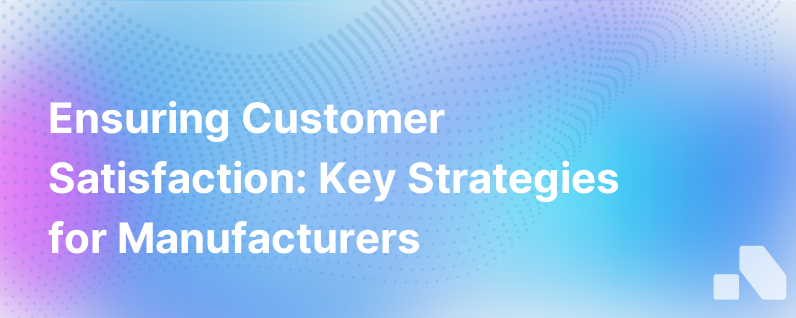Its Critical For Manufacturers To Keep Their Customers Happy Heres How To Do It
Published on December 16, 2023 by Sawyer Middeleer
In the manufacturing sector, where supply chains are complex and lead times can be long, customer satisfaction is paramount. Happy customers are loyal customers, and they can become advocates for your brand, providing invaluable word-of-mouth advertising that no marketing budget can replace.
However, with a multitude of touchpoints and variables at play, keeping customers consistently satisfied is a challenging endeavor. It requires a strategic approach, encompassing everything from initial contact through post-sale support and beyond. Here’s a comprehensive plan for manufacturers to ensure their customers stay happy and committed.
Understanding Customer Expectations
The first step in keeping customers content is to understand what they expect from you as a manufacturer. Expectations can include high-quality products, on-time delivery, competitive pricing, proactive communication, and swift resolution of any issues. Conducting regular surveys and feedback sessions is one way to stay attuned to customer expectations.
Quality is Non-Negotiable
For manufacturers, the quality of their products is a significant determinant of customer happiness. A focus on quality control at each stage of production is vital. Implementing a quality management system (QMS) in line with ISO 9001 can help ensure consistency and reduce the chances of defects reaching your customers.
Timely Deliveries are Crucial
On-time delivery is another make-or-break factor in customer satisfaction for manufacturers. Delays can have significant downstream impacts on your customers’ operations. Advanced planning, inventory management, and robust logistics strategies can help avoid preventable delays. Additionally, investing in supply chain visibility tools can provide real-time updates to your customers, increasing transparency and building trust.
Transparent and Proactive Communication
Open lines of communication are a foundation for positive customer relationships. It's critical to inform customers of any delays or issues as soon as possible, rather than hiding them or hoping they'll go unnoticed. Similarly, being available and responsive to customer inquiries can go a long way in maintaining satisfaction. Embrace technologies that enable efficient communication, such as customer portals or chatbots where relevant.
Competitive Pricing with Value
While pricing will always be a factor, competing on price alone is a race to the bottom. Instead, manufacturers should focus on adding value for their customers. This can include offering flexible payment terms, bundled services, or loyalty programs. But remember, value does not solely come from monetary savings; it's also derived from the assurance that they have a reliable partner in their supply chain.
Customize and Personalize Where Possible
Personalization can set your brand apart in a market where many products can seem interchangeable. Offering customization options, even in small ways, can make your customers feel like they have a unique solution tailored to their needs. Customer relationship management (CRM) systems can assist in keeping track of individual customer preferences and history, further enhancing personal engagement.
Invest in After-sale Support
Your relationship with a customer doesn’t end at the sale; in many ways, it’s just the beginning. Robust after-sale support is critical in ensuring your customers feel taken care of. This includes having reliable warranty policies, responsive customer service teams, and offering maintenance or repair services where relevant. Manufacturers that excel in after-sale support often see higher levels of customer retention.
Leverage Customer Feedback
Actively soliciting feedback is not just about gathering data - it's a signal to your customers that you value their input and are committed to continual improvement. Use surveys, focus groups, and follow-up calls to gather insights, and more importantly, act upon them. Making noticeable changes based on customer feedback is key to demonstrating that their voices are heard.
Employ Technology for Customer Experience
Technology has revolutionized the way manufacturers can service their customers. From IoT-enabled devices reporting real-time status of equipment to AI platforms that offer predictive maintenance, these advances can lead to better product lifecycles and customer experiences. Equally, CRM technology can help you maintain detailed records of each customer's individual preferences, past purchases, and feedback.
Commit to Corporate Social Responsibility
In today’s world, customers care not just about what they buy, but also from whom they buy. Manufacturers who commit to sustainable practices, ethical sourcing, and community engagement often foster deeper connections with their customers. Corporate social responsibility (CSR) initiatives can be a strong selling point and a differentiator in the market, contributing significantly to a positive brand image and customer satisfaction.
Continuous Improvement Culture
Finally, fostering a culture of continuous improvement within your organization can lead to a virtuous cycle of customer satisfaction. Encouraging your staff to always look for ways to enhance the customer experience can lead to innovation at various levels. From incremental improvements in product design to major efficiency gains in the supply chain, a continuous improvement mindset can effectively keep your customers happy.
In conclusion, customer happiness is not a standalone business goal; it's the outcome of a complex interplay between your products, communication, support, and the overall value you provide. Manufacturers that embrace a customer-centric approach across these factors not only satisfy their current customer base but also set the stage for new customer acquisitions through a sterling reputation.
Your sales strategy can significantly benefit from adopting tools like Aomni. By bringing AI-powered insights and streamlined processes to your sales teams, you can ensure that your team is well-equipped to address customer needs efficiently and effectively, thereby contributing to higher customer satisfaction and loyalty.